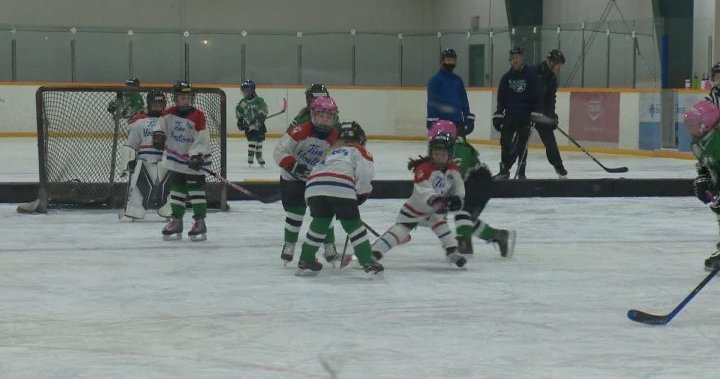All hockey leagues in Canada should raise the age when bodychecking is allowed, the Canadian Paediatric Society is urging in a new research paper.
The recommendation was made Wednesday in a report authored by University of Ottawa professor Dr. Kristian Goulet, citing studies that link bodychecking to concussions and the brutal effects of the injury.
Hockey organizations and competitive hockey leagues must implement new policies and rules to prevent bodychecking before players are 15-years-old, pediatricians Dr. Kristian Goulet and Dr. Suzanne Beno wrote in a joint statement.
“By eliminating the bodychecking altogether up until 15, we can do huge, huge favours for our to our kids,” Dr. Goulet told Global News Thursday. “Both from their neurologic health in terms of concussion, but also we know concussions affect mental health.”
Hockey Canada, which governs the sport, currently bans checking in leagues with players younger than 13, for women’s and girls’ leagues, and in any other division that a member association approves.
Drawing on other research, the paper states concussions count for 80-90 per cent of traumatic brain injuries, that 200,000 concussions occur every year in Canada mostly among children and youth and that hockey was the leading cause of traumatic brain injuries in all sports across all youth age groups in the country.

Other studies cited in the paper show injury rates are about 50 per cent lower in youth leagues without bodychecking.
One 2017 study published in the British Journal of Sports Medicine claims that eliminating bodychecking would decrease concussion rates across the entire country between 20 to 90 per cent.
Concussion symptoms range from nausea and vomiting, difficulties remembering and emotional instability. Most children and youth recover from concussions within four weeks, but others can suffer longer.
The Paediatric Society’s new paper also warns of the connection between concussions and Chronic Traumatic Encephalopathy (CTE), a brain disease that is often fatal.
Goulet, a University of Ottawa professor and pediatrician, also said concussion effects are cumulative.
When asked by Global News if it would consider changing its policies in light of the call from the Canadian Paediatric Society, Hockey Canada pointed to its move to recently remove bodychecking for U13, but didn’t say whether it would make the recommended changes to ban the practice until the age of 15.


